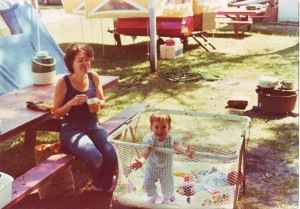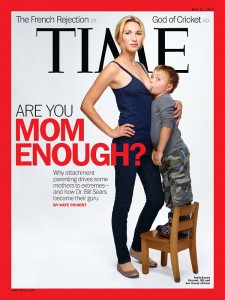While researching my post on the social and economic costs of breastfeeding, I realized new moms often face scrutiny no matter how they feed their babies. Stories shared by friends and colleagues sent me reflecting on my own experiences, which some have called unusual.
My mom nursed me until I was five years old. That’s right, five. She didn’t contend with a meddling mother-in-law, as some of my sources did, and her friends seemed generally supportive. But I’m guessing she faced skeptics in the mid-1970s. According to an article in the Journal of Nutrition, only 33 percent of women breastfed in 1975.
As a young child, I thought my experience was common. Years later I discovered my mom and I were an anomaly. Friends were aghast when they learned how long I nursed. My siblings still mock me. And my husband reminds me that one year is the nursing cutoff for our daughter. At least the World Health Organization, which recommends breastfeeding two years or longer, would applaud my late mom’s valiant efforts.
The Tie that Bonds
I don’t know how she had the patience and fortitude to stick it out for so long. I do, however, have a sense of why. She had my sister and brother well before me, in the mid-1960s, and her marriage to their biological father soon dissolved. As a single mom, she had to return to work. Her time with my siblings was limited, a sad reality that saddled her with guilt. My arrival offered her a shot at redemption. Though she never said so, I believe her lavishing me with years of nursing mollified some of the guilt.
Her choices in mothering, including nursing, sealed an emotional bond that has served me well in the 23 years since she died. It’s a bond that helps me remember her. At this point, with time eroding my once-vivid recollections, I’m grateful for any memories.
My own motherhood also has shed new light on the bond. The strong attachment I developed with her in early life formed an emotional reservoir within me. I have–often unconsciously–tapped into that reservoir in mothering my son and daughter.
Breastfeeding was just one way my mom mothered well. But it was a critical one. Because she died young, I didn’t get much quality time with her. Five years of nursing meant I had a lot of her undivided attention–perhaps more time than most children get. It’s an invaluable gift. The benefits have extended beyond me, to my children. I hope they one day reach my grandchildren, too.
Attachment Parenting, 1970s-style?
As I was working on my posts about breastfeeding, news broke of Time Magazine’s incendiary cover shot of a young mom breastfeeding her toddler son. The Internet was full of chatter about the image. Was it appropriate? Why can’t we stop the mommy-wars? Won’t the little boy be scarred with lifelong embarrassment?
I bought the magazine, and found the accompanying story on attachment parenting to be much less subversive than the cover.
The article examines the life and philosophy of Dr. William Sears, “who wrote the attachment-parenting bible, The Baby Book.” Sears and his wife, Martha, have eight children, and they tout a style of parenting opposite to how they were raised.
Martha explains that she’s opposed to letting babies cry partly because of seeing a relative who was left to cry in her crib. As an adult the relative has suffered from mental illness, which Martha attributes to the extensive crying:
After seeing all this, how could Martha not tell everyone she knew–and millions she didn’t–never to let their babies cry? “You could say I’m reacting to my background,” she says.
The Searses’ approach to parenting appeals, offends and confuses. It may drive some to extremes. But such extremism doesn’t mean all moms should follow suit. Nor do I think Dr. Sears intended to drive moms to the brink, or pit us against each other. Nowadays he tells moms to “Do the best you can with the resources you have.”
That’s great advice. It’s what my mom did. She didn’t have the resources to mother my siblings the way she had hoped. But she tried to do better the third time. Like Martha Sears, she reacted based on her life experiences. What mom doesn’t?
I’d like to think my mom was a renegade. That she blazed her own trail of attachment parenting: 1970s-style, and well before it became a movement. Breastfeeding until I reached kindergarten didn’t scar or embarrass me, as some might think. I’m proud of my experience. And glad that my mom clung so ardently to her beliefs about what was best for me and her.
If I can do half as good a job with my babies, I’ll be grateful.
Related Links
- The Resurgence of Breastfeeding at the End of the Second Millennium (Journal of Nutrition)
- Time Magazine’s Breastfeeding Cover: Moms React (Yahoo! Shine, May 10, 2012)
- Got Milk? Breastfeeding’s Not Free or Easy (Mama Writes, April 14, 2012)


I have to say it was a great experience with all three of my children. It wasn’t always acceptable by others as it made them uncomfortable. I found myself standing in public bathrooms, hiding in the car while stares from strangers once they figured out what I was doing. I was always covered and modest but still felt like I had to defend myself. Funny how society views nursing. You can watch commercials with more exposure!! I encourage all moms if they want to nurse to try it and not give up. I never had anyone around that encouraged me or ask any questions so I know how important it is to be understanding of moms. I think there is a point though of moms letting go at a certain age. My mom did it far to long and as a child myself I was embarassed!!
Good for you for sticking with it, despite much validation or support from others. I hear this all too often: Moms, no matter what path they’re taking, fail to get reinforcement from friends, family and acquaintances–especially emotionally. Your point about balance is important, too. Holding on too tightly, for too long, wreaks its own brand of damage.